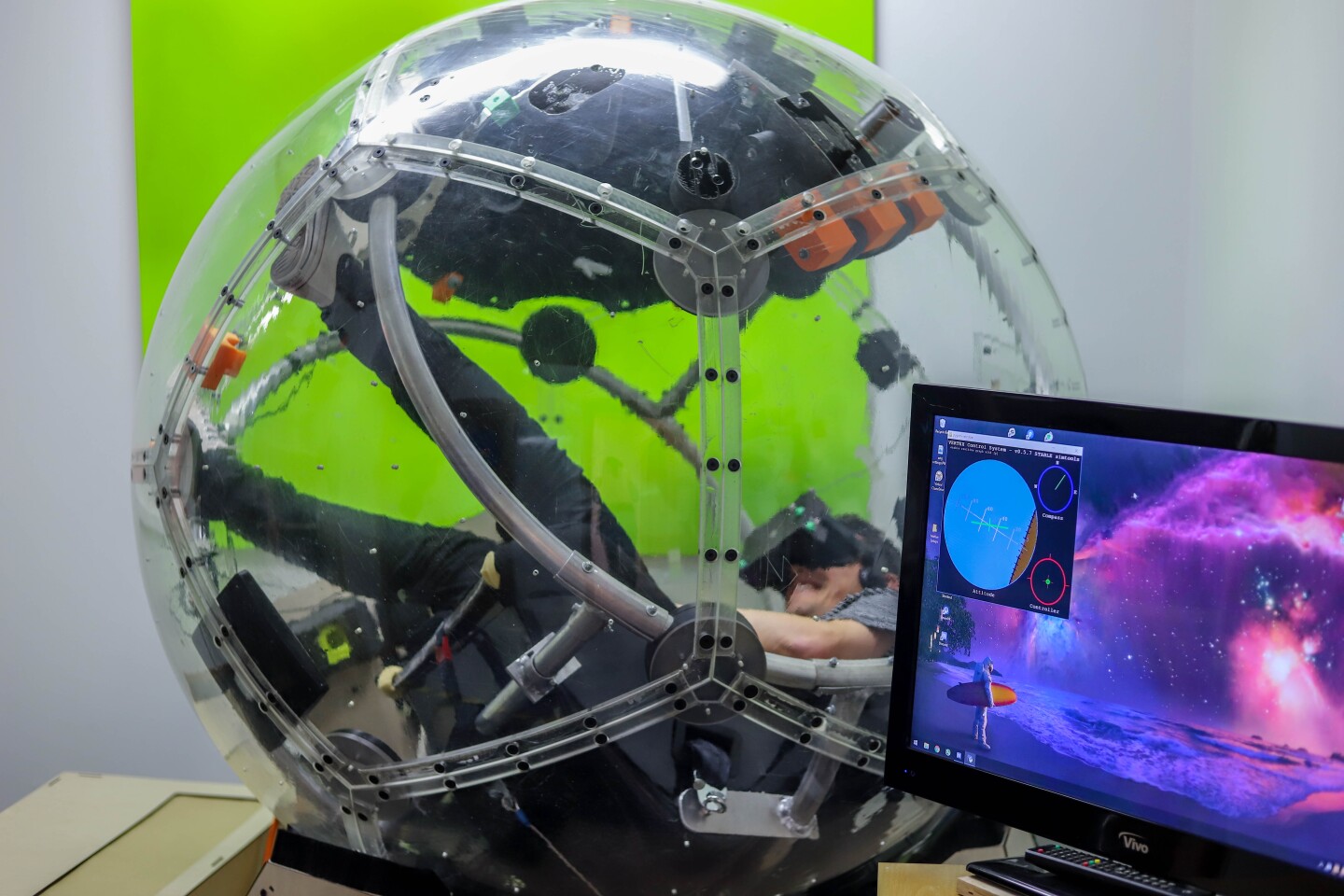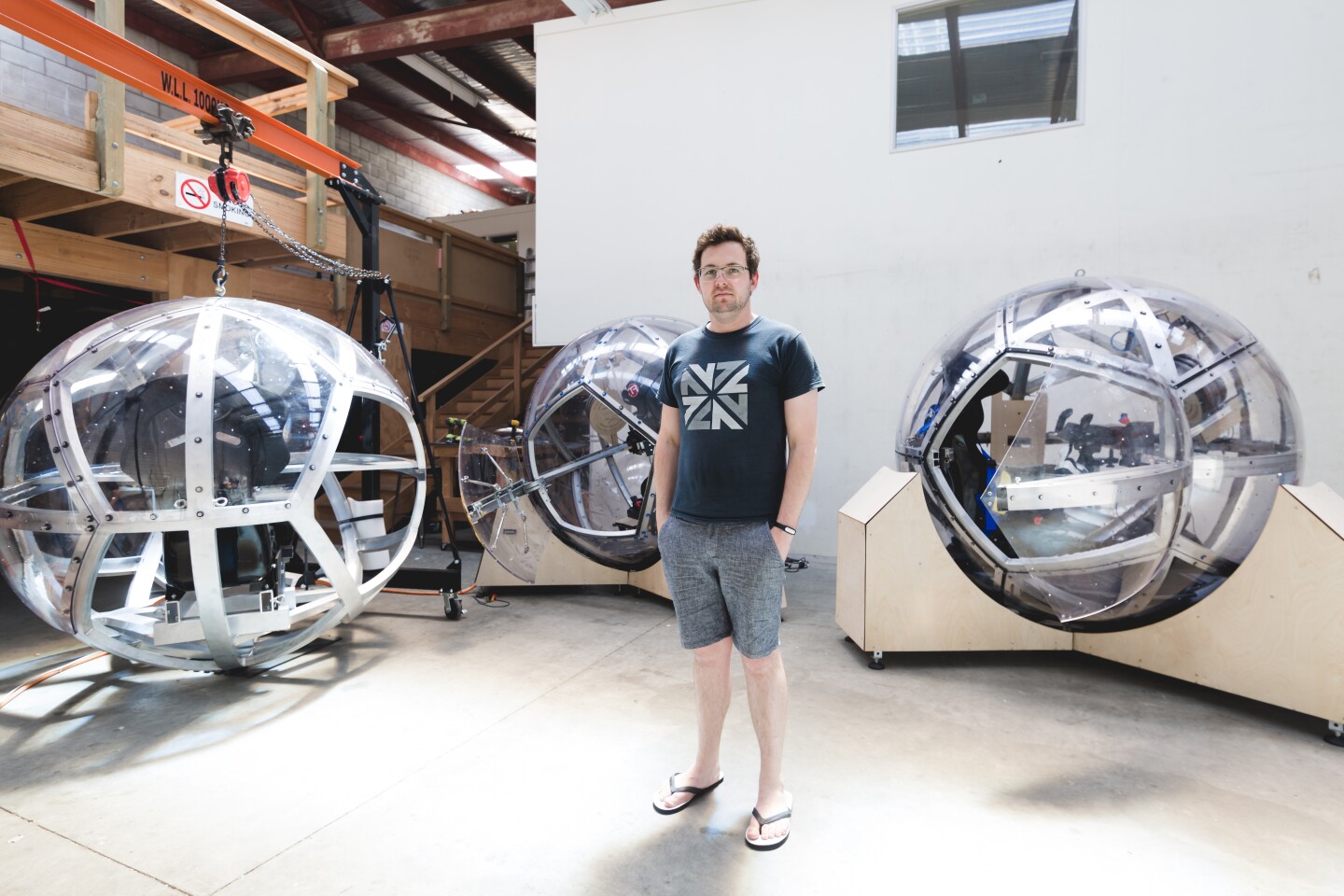2020 Apr 23
–
By far the most extreme gaming and simulation platform we’ve seen, the Nova places you in a fully untethered ball that’s free to spin in any direction, creating all sorts of wild gravity effects for total immersion in a range of different vehicle types.
It’s the work of New Zealand startup Eight360, which has risen from true garage status to produce what Founder/CEO Terry Miller calls, “the crazy spinning ball of death.” Terry spoke to us from a birthing center in Wellington just one day after the birth of his first child. “She came before the midwife even turned up,” he told me, “so we had an accidental home birth on the bathroom floor. Surprisingly quick, just fell out.”
Infused with the manic energy of both sleepless new father and sleepless startup founder, Miller explained how the idea started out as a “weekend hobby beer project” at the Wellington Makerspace, to perhaps build a helicopter hover training rig – including VR was merely an excuse to buy headsets. The initial “super janky” prototype was blacked out, totally dark inside and ran off a car battery. “It actually worked surprisingly well,” says Miller, “until some metal shavings got in the computer and blew it up, while someone was inside it. It’s OK, it was one of us. A founder, that’s fine. But it was actually really cool, and we thought we could make this better.”
The team raised enough cash to move into a half-office in a condemned building. “It was a leaky garage, half full of cars and half full of us,” Miller says. “Water pissed in and pooled on the floor when it rained, and it was up a dodgy ramp, so we couldn’t get these big balls in and out without some difficulty. But it was cheap!”
From there, it was full steam ahead iterating through another generation before completing the V3 Nova platform shown here and moving the company into a proper facility. About 2 m (6.5 ft) on each side, the Nova weighs less than 500 kg (1,100 lb), meaning it can be moved on a pallet jack or stuck in a shipping container for transport.
The base plugs into a standard three-phase socket, while the ball itself contains a powerful computer, a battery power storage rig, a chair and harness, a VR headset and more or less whatever kind of control scheme you want to put in there, from car controls to flight yokes, helicopter controls, etc. Even the seats can be switched out to match the vehicle you’re emulating.
The VR tracking system is a custom design, programmed to take account of the ball’s ability to place itself in any orientation. “We put you upside down,” says Miller, “but you’re still upright in the chair, so we have to cancel out the motion of the platform. Nobody else has done that, it’s kinda cool.”
The ball sits on, and is moved by, three omni wheels, each of which is capable of driving the ball in one direction without impeding motion in the other directions. This gives the software the ability to pitch, roll or yaw the ball in any direction and at great speed. “It’s complicated, says Miller. “I was always terrible at math. I failed calc and barely got into engineering, and then I had to teach myself all kinds of crazy stuff to make this work. I wrote the entire control system myself in Python.” He stresses he’s not a programmer; lord help the long-suffering software engineers that had to get in and clean up that code for production.
The motors driving the omni wheels are comically over-specified for their job. “We specked out ridiculous motors for it,” says Miller. “So now it has a nominal roll rate of 180 degrees a second, which is too fast, but that’s cool. That’s faster than a phantom jet fighter. It’s lots. The motors are overkill, we’re turning them down.”
The gravity effects don’t just simulate tilt angles; they do a pretty amazing job of simulating acceleration, deceleration, turning forces, bumps and crashes. “So you’re on the runway in a fighter jet in VR,” says Miller, “and you hit the throttle to accelerate for takeoff. We roll you back in your seat, but your view stays exactly the same, and it feels like the acceleration is pushing you back in your seat. It feels real, like you’re actually going to kill yourself. This is how it ends. Haha! You’re actually convincing somebody that they’re somewhere else. That’s one of our tag lines: be transported.
“What’s interesting is that human perception in a lot of situations is relative. Even if the g-forces aren’t proportional in magnitude to what you’re seeing on the screen, it’s the difference between down and sideways. You can fudge a lot of sensations like that. And then there’s the haptics, the g-seats, the vibrators, the tightening harness straps that a lot of high-end sims have. There’s so much to play with!”
Without modifications, the Nova works with off-the-shelf games and simulators like X-Plane, DCS World, Virtual Battle Sim 3, Dirt Rally, iRacing and Project Cars. “It’s just responding to the physics in the content,” says Miller, “so when you change vehicles, they feel very different. Like a racing car might feel very hard and stable and touchy, but then you load up a jeep, it starts feeling like a great lumbering, rolling thing.
“We were working with some software that let us move the center of gravity around in a truck, and boy could you feel that. When you went round a corner with a higher center of gravity, you could feel it wanting to tip over, it felt super dodgy. It gives you what the Army boys call the ‘pucker factor,’ and that’s a real part of learning to drive these rigs. People forget it’s not real.”
Unfortunately, you probably won’t be seeing the Nova ball in your man-cave any time soon. It’s too expensive to make any sense in the gaming market. Instead, Eight360 is working with defense forces, mining and forestry industries where vehicles cost millions of dollars, accidents are a very big deal and training needs to encompass tilt angles. “We’re looking to lease them as a hardware as a service model,” says Miller, “with ongoing maintenance and upgrades. It’ll be on the order of US$150k a year. So heavy, yeah.”
There are also opportunities in remotely-controlled drone vehicles, from forestry tree-cutters to airborne drones, where being embodied inside the vehicle virtually can confer big advantages, particularly where steep slopes are involved.
And Miller would love the technology to make its way into the developing e-racing world. COVID-19 lockdowns ruined Eight360’s planned launch event for the Nova platform, but has elevated e-racing to become basically the only game in town. “I loved the recent New Atlas article on the rise of e-racing. Most of the pro racers that are getting into this stuff have great home rigs, with the three monitors and the steering wheels and all that, but they don’t move, so they can’t feel what’s going on,” he says.
“It’s missing something. We’re trying to bring that feeling back, to put you right in the game. You’re in it, you’re there. There’s a big opportunity there. Track time is very expensive for pro drivers, and they need every bit of an edge they can get over their competitors. And since everything’s contaminated outside, e-racing is the new racing. You can get in this thing and feel the car moving, feel as if you’re going down a hill, feel things moving around near the limits.”
With a number of awards in his back pocket now, including NZ Young Engineer of the Year and a nomination for Young High Tech Achiever of the Year, Miller has assembled a team of “hardcore engineers” that have come to Eight360 from as far afield as Lockheed Martin and Tekron. “We currently have a team of 10 plus extras, pretty much all engineers,” says Miller. “Many of these guys have been here since before I could pay them.”
The company now has three V3 Nova rigs built and is ready to take orders and move to production.
“This is a very complex bit of equipment, it’s high tech, it’s not easy, and these guys … They’re all here to build amazing things, and that’s our whole culture. The #8 wire and hot glue gun is the best, masking tape on everything, and we’re here to build something cool just because it’s cool. There’s two reasons people become engineers. One is to help people and make the world a better place and solve problems, and the other is to make an Iron Man suit and blow shit up. I’ll allow you to guess which one is me.”
With that, I let Terry get back to his newborn daughter. She and mum are doing fine despite making a fairly spectacular entrance. We look forward to seeing where things go with the Nova ball. Check it out in the video below.
Eight360 NOVA 2020 demo – VBS3
Source: Eight360
–
(For the source of this, and many other equally interesting articles, and to watch the “demo video” please visit: https://newatlas.com/vr/eight360-nova-vr-simulator-ball/)












